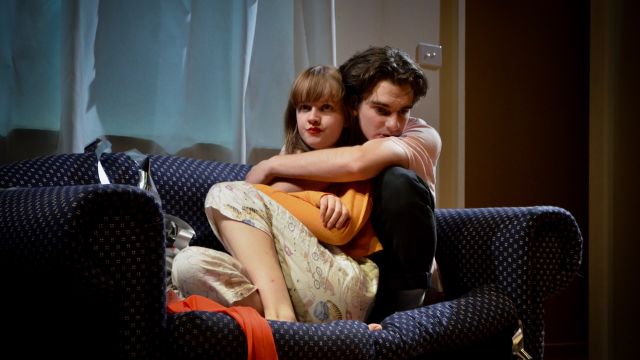Tusk Tusk
Here is an intense family drama, first produced in 2009, which confirmed twenty-two-year-old Polly Stenham’s reputation as the playwright to watch. It’s about three ‘poor little rich kids’, abandoned it seems by their feckless mother and waiting – and waiting – for her return in a partly furnished London flat. ‘A ghost story without a ghost.’ Yes, they may be upper-middle-class, ‘privileged’, but that hasn’t saved them from trauma, neglect and abuse – and they are already on an ‘at risk’ list. Their father is long dead and their serially absent mother sounds like a basket case. Eliot (Ben Walter), about to turn sixteen, is the eldest, big brother to fourteen-year-old Maggie (Markella Kavenagh) and seven-year-old Finn (Liam Smith at my performance, alternating with Sol Feldman). These kids love each other in the ambivalent way siblings do, but Polly Stenham puts them in a pressure cooker and brings it to the boil.

Despair and panic take over as time ticks on and there is no sign of Mother, not even a phone call. An angry neighbour keeps pounding on the door and demanding to speak to a ‘parent’. Recalcitrant Maggie challenges Eliot (‘My brother – King of my childhood- where the fuck are you? Are you gone too?’). He’s never had to be this responsible before and is very bad at it, game-playing, chivvying, teasing, bullying and lying, eventually becoming vicious. Mr Walter may wind Eliot’s emotional pitch just a little too loud and tight at times, but the character is an overwrought and frightened boy of fifteen and he doesn’t let us forget that.
Sharp-tongued sister Maggie is smarter and more mature than he, but her disillusionment with Eliot renders her febrile and exhausted. Ms Kavenagh is a superb Maggie – close to breaking and immensely touching. Ms Kavenagh hasn’t forgotten what it’s like to be a fourteen-year-old girl but here one who has already seen too much and knows too much - and ‘Being a girl is a fucking mission!’
As for Finn, well, he’s a kid: missing his mother, not happy but adaptable and making the best of it. Liam Smith endears himself to the audience; he’s entirely natural and convincing as a little boy who doesn’t really understand but continues to rely on his brother and sister. Eliot is terrified that if they seek outside help, the authorities will separate them, and Finn will go to strangers.
But Eliot, claiming to be a ‘metrosexual warrior’ (a good example of his whistle-in-the-dark blather), ventures out at night, maybe to find sex ‘before it’s illegal’ – and returns with Cassie (Lucy Ansell). She’s shocked at what she sees but wants to help – infuriating Maggie… Lucy Ansell plays her working class and black Cassie as nice, naive and sweet – perhaps too sweet and the class difference with the siblings could be clearer: her angry speech about having to earn a living isn’t angry enough.
 Director Ruby Rees does a fine job, intuitive and skilled in stage craft. She keeps up a high emotional pitch but throws in powerful moments of silence; she moves her characters around the transverse stage inventively – and allows the audience on both sides maximum visibility. But she has a charged text to work with. Polly Stenham writes her characters with great acuity – and she gives them dialogue that can go from humour to despair in the space of a sentence.
Director Ruby Rees does a fine job, intuitive and skilled in stage craft. She keeps up a high emotional pitch but throws in powerful moments of silence; she moves her characters around the transverse stage inventively – and allows the audience on both sides maximum visibility. But she has a charged text to work with. Polly Stenham writes her characters with great acuity – and she gives them dialogue that can go from humour to despair in the space of a sentence.
When the ‘adults’ – Katie (Jayne-Louise O’Connell) and Roland (Glenn van Oosterom), friends of the absent mother, show up and enter this maelstrom, the play falls into melodrama. Is this deliberate? Or is Ms Stenham now dealing with characters less in her grasp? But the tone – and the play’s craft – falter. Ms O’Connell takes a moment to find her feet - too much the upper-class airhead – but that’s how she’s written - and Mr van Oosterom isn’t strong as a villain – but that’s how his Roland is written too.
Ms Stenham gives herself two problems, both due perhaps to how emotionally close the play is to her own experience. First, the play runs over two hours, but feels longer because to milk the passing of time within a static situation it becomes repetitious: characters state their positions and emotions too many times, engendering just a slight impatience. Second, there is the problem of wrapping things up and so we get the contrivance of Katie’s and Roland’s intrusion, and what we might call the ‘explanation climax’. Eliot, surprisingly, turns out to know far more than we thought he did, and Maggie reveals a knowledge too horrible for a fourteen-year-old to bear. But then Ms Stenham pulls it back. When all that Eliot has feared looks like coming to pass, the fate of the children – and they are children – is left frighteningly open.
Michael Brindley
Subscribe to our E-Newsletter, buy our latest print edition or find a Performing Arts book at Book Nook.

